Federal Rule 701: Understanding Lay Witness Testimony
FRE 701, Opinion Testimony by Lay Witnesses, delineates the distinction between opinion testimony by lay witnesses, in contrast to what is required for expert testimony.
Updated on
What is FRE 701?
Federal Rule of Evidence 701 permits the opinion testimony of a witness who is not qualified as an expert if the testimony meets the following criteria:
- Rationally Based: The opinion offered is grounded in the witness's perception or personal knowledge.
- Helpful to the Jury or Judge: The opinion testimony will help the factfinder to understand the witness's testimony or to determine a fact in issue.
- Not Based on Scientific, Technical, or Specialized Knowledge: Unlike expert testimony governed by Rule 702, opinion testimony by a lay witness cannot require specialized qualifications.
History and Amendments
Enacted as part of the original Federal Rules of Evidence in 1975, Rule 701 has undergone several amendments aimed at clarifying its application and ensuring the reliability of lay opinion testimony. The most substantive amendments occurred in 2000, to exclude testimony requiring specialized knowledge from Rule 701. This amendment was intended to prevent expert testimony disguised as lay testimony.
Interplay with Rule 702
The analysis of whether opinion testimony must be qualified under Federal Rule of Evidence 701 or 702 depends on the content of the testimony, not the status of the witness. For example, in United States v. Figueroa-Lopez(1997), the 9th Circuit held that a DEA agent’s testimony about whether the defendant was acting suspiciously was properly qualified as lay testimony under Rule 701, but statements about specific drug terminology should have been qualified as expert testimony.
Another crucial distinction between lay and expert witness testimony is the disclosures required. If expert testimony is offered under Rule 702, the proffering party must provide the opposing party with a pre-trial report. This outlines the expert’s qualifications, the opinion testimony offered, any exhibits that will be used and the underlying facts and data, a list of other cases where they have provided testimony, and the compensation they are receiving. In contrast, the basis for lay opinion testimony is not as formal and can be established through direct examination.
Impact of the Daubert Standard
The Daubert standard, articulated in Daubert v. Merrell Dow Pharmaceuticals (1993), has further shaped the rules around expert testimony under Rule 702. The Daubert factors reinforce the distinction between lay and expert testimony under Rule 701 and Rule 702.
Practical Applications
FRE Rule 701 is relevant in many types of cases. In a contract dispute, business owner might offer an opinion on the profitability of a business or a particular business practice. In a criminal trial, a witness could testify about the appearance of an individual at the scene of an incident. In an automobile injury action, a witness might testify about weather conditions and visibility.
Notable Cases and Circuit Splits
The contours of Rule 701 have been heavily litigated in federal and state courts, with some notable differences in application across states and circuits. In 2020, Petitioners in Lenin Lugo v. United States the Supreme Court to take up the question of whether law enforcement officers' testimony can be qualified under Rule 701 or Rule 702, resolving a circuit split, but the Supreme Court declined to grant certiorari.
In State v. Sasser (2017), the Kansas Supreme Court held that a motorcycle owner and enthusiast was properly qualified to provide an opinion on the value of damage to a motorcycle under Rule 701, even though the owner’s ability to provide this information was based on extensive knowledge of motorcycles beyond that of an ordinary person.
In Daedalus Blue LLC v. Microstrategy, Inc. (2023), a patent infringement case, a judge in the Eastern District of Virginia held that an executive’s statement about the design of a product should not have been admitted under Rule 701, as it required specialized knowledge. Because the executive had not been qualified as an expert, and the required expert disclosures had not been made, the statement was excluded from trial.
In Village of Freeport v. Barrella (2016), an employment discrimination case, the 2nd Circuit held that the testimony of an employee about racial discrimination in the promotion process should not have been qualified under Rule 701 because the employee did not have firsthand knowledge of the hiring process. The $1.35 million verdict for the plaintiff was overturned.
Conclusion
For litigators in Federal Court, understanding the distinctions between lay and expert opinion testimony, and how courts in their jurisdictions will apply the rule, is crucial to having evidence properly admitted or excluded. Understanding how to qualify opinion testimony can help attorneys be strategic in their use of both expert and lay witnesses at trial.
Frequently Asked Questions
What are the criteria for lay witness testimony under FRE 701?
The criteria for lay witness testimony under FRE 701 are that the opinion must be rationally based on the witness's perception, helpful to the jury or judge, and not require scientific, technical, or specialized knowledge.
How does FRE 701 differ from FRE 702 for expert testimony?
FRE 701 allows lay witnesses to provide opinion testimony based on their personal knowledge without requiring specialized qualifications, while FRE 702 governs expert testimony that must be based on scientific, technical, or specialized knowledge and requires prior disclosures regarding the expert's qualifications and the basis of their opinions.
Can a lay witness provide opinion testimony in court?
Yes, a lay witness can provide opinion testimony in court if it is rationally based on their perception, helpful to the jury, and does not require specialized knowledge.


